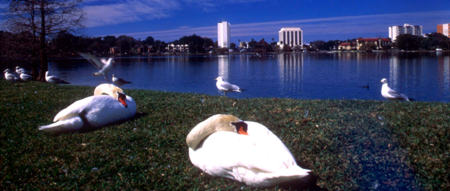Orlando, Florida
Six Florida researchers working with a
Michigan State University associate professor and a medical mycologist
from the Centers for Disease Control and Prevention in Atlanta,
Georgia have become the first to prove that rhinosporidiosis
in swans is the same protozoan affecting both humans and other
animals.
Dr. Geoffrey R. Gardner, a Lakeland veterinarian
and researcher with the The Regal Swan™ team, removed eye
cysts caused by the protozoan, Rhinosporidium seeberi, from 41
infected swans at Lake Morton in Lakeland, Florida. Dr. Leonel
Mendoza, an associate professor with the Medical Technology Program,
in the Department of Microbiology and Molecular Genetics from
Michigan State University and Dr. Libero Ajello, a medical mycologist
in the Mycotic Diseases Branch of the Centers for Disease Control,
utilized DNA sequencing analysis to determine the genetic makeup
of the protozoan.
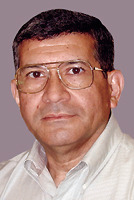 Dr. Leonel Mendoza
Dr. Leonel Mendoza
 Dr. Libero Ajello
Dr. Libero Ajello
DNA taken from the eye cysts of the swans
was subsequently examined and tested with DNA from cysts with
rhinosporidiosis taken from humans. The DNA analysis revealed
the R. seeberi in both species is the same species.
This find is historically important. Rhinosporidiosis,
once thought to be caused by a fungus is now proven to be a protozoan.
This organism is found in moist, warm environments and is most
prevalent in India, Sri Lanka and southeast Asia, although cases
have occurred in Africa, Central and South America, Europe and
the United States. This protozoan has never been cultured and
its natural habitat remained unknown.
Rhinosporidium seeberi is a natural occurring
micro-organism that infects the mucus surfaces of humans and
animals who come into contact with it. Rhinosporidiosis is a
byproduct of the micro-organism. It's a non-contagious chronic
infection that usually manifests itself in the form of slow-growing-tumor-like
masses that affect the nasal passages or the eyes. Currently,
surgical removal is the only available treatment.
However, this study showed that by surgically
removing the cysts, the swans showed a spontaneous remission
(no noted reoccurrence of the parasite). More testing is expected
to be conducted by the doctors and The Regal Swan™ researchers
to find more information on this elusive parasite.
The DNA testing was conducted in conjunction
with a three-year study by The Regal Swan™ for a vaccine
for botulism in swans. The group recently found that Pfizer's
Ultrabac® CD is highly successful in combatting
the deadly Clostridia bacterial toxin.
Researchers for The Regal
Swan™ include: Geoffrey
R. Gardner, D.V.M., Lakeland Veterinary Hospital, Lakeland, Florida;
Christopher W. Brown, D.V.M., Central Florida relief veterinarian,
Orlando, Florida; Fanchon F. Funk, Ed.D., associate professor,
Florida State University, Tallahassee, Florida; Sheila A. Bolin,
M.S., swan keeper, Orange Lake Resort & Country Club, Orlando,
Florida; Rebecca Webb Wilson, J.D., professional photographer
and lifetime trustee of the Memphis Zoological Society, Memphis,
Tennessee; and Shirley A. Bolin, A.G.S., head photographer and
staff writer, Orange Lake Resort & Country Club, Orlando,
Florida.
In addition to working with Drs. Mendoza and Ajello, The Regal
Swan™
researchers have also been working closely with Her Majesty's
Royal Swan Warden, Dr. Christopher Perrins, director of the Earl
Grey Institute of Ornithology, Oxford University, London, England;
and Her Majesty's Swan Marker, David Barber, London, England,
during the three-year study conducted at Lake Morton, in Lakeland,
Florida and Orange Lake Resort & Country Club, in Orlando,
Florida.
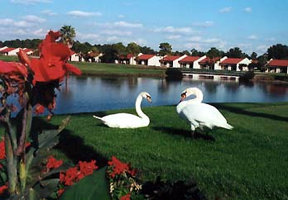 A pair of English Mute Swans
on the banks of Orange Lake's Fountain Lake. The eight-acre lake
is man made.
A pair of English Mute Swans
on the banks of Orange Lake's Fountain Lake. The eight-acre lake
is man made.
Photo By Shirley Bolin©.
All rights Reserved. The Regal Swan™
Sponsors Include:
Pfizer Animal Health, Orange Lake Resort & Country Club, City
of Lakeland, Florida, Lakeland Veterinarian Hospital, Antech
Diagnostic Labs, Inc., American Camper, Blitz® USA, Bushnell
Sports Optics Worldwide, Cobra Electronics, Hunt Manufacturing
Company, Kaz Incorporated, Lab Essentials, Inc., The National
High Magnetic Laboratory, Florida State University; The Memphis
Zoo, Orlando Science Center, Thamesweb, Windsor, (Theroyalwindsorwebsite.com) England; Sharn
Veterinary, Inc., The Sports Authority, Times®, VetCare,
Vicks Company, IQ Scientific Instruments and Western Pest Services.
|
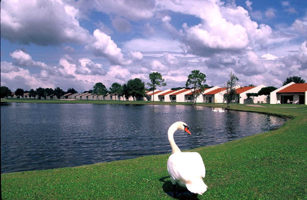
English Mute Swans reside at Orange
Lake Resort & Country Club in Orlando, Florida.
Photo By Rebecca Webb Wilson©.
All rights Reserved.
The Regal Swan™
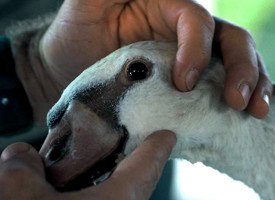 An English Mute Swan's eye is examined
for the cyst.
An English Mute Swan's eye is examined
for the cyst.
Photo By Rebecca Webb Wilson©.
All rights reserved. The Regal Swan™.
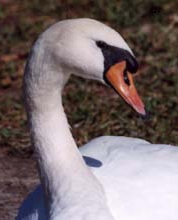 An English Mute Swan's eye is normal
in this photo.
An English Mute Swan's eye is normal
in this photo.
Photo By Rebecca Webb Wilson©.
All rights Reserved. The Regal Swan™
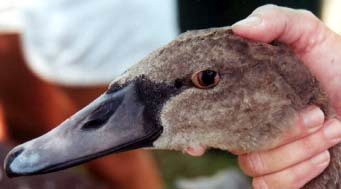 Rhinosporidium
Rhinosporidium
The cyst caused by the protozoan on an English Mute Swan's eye.
Photo By Shirley Bolin©.
All rights Reserved. The Regal Swan™
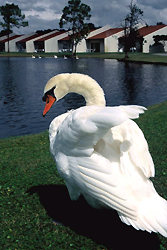 An English Mute Swan surveys its
surroundings on the Fountain Lake at
An English Mute Swan surveys its
surroundings on the Fountain Lake at
Orange Lake Resort & Country Club in Orlando, Florida.
Photo By Rebecca Webb Wilson©.
All rights Reserved. The Regal Swan™
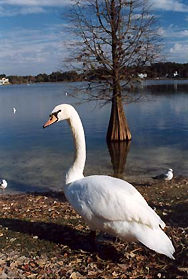
Lake Morton is home to more than
200 swans including English Mute Swans, Australian-Black Swans
and South American Black-Necked Swans. The lake is also home
to many other bird species including pelicans, geese, ducks,
seagulls, egrets, blue herons and wood storks.
Photo By Shirley Bolin©.
All rights Reserved. The Regal Swan™
|


